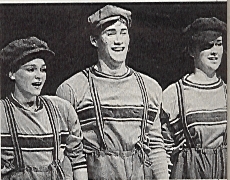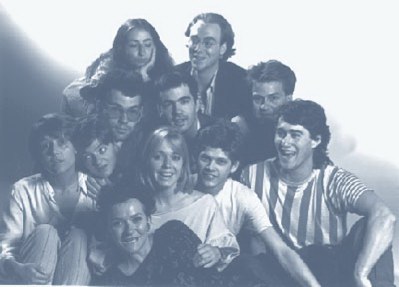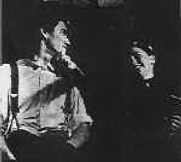










National Theatre School Year Book
1987
In 9 out of 10 of Roy’s interviews you will hear of how he flouted the rules of the National Theatre School to gain entrance.
This is a statement of those rules as defined in the French version of the School Year Book for the year in which he graduated.
There follows a description of the course he took at the School.
General Information
Enrolment:
Candidates may obtain an audition and interview form from the School secretary. They must complete it and return it before the 1st February, accompanied by a cheque or postal order for $35 made out to the National Theatre School of Canada. This is not refundable.
Eligibility:
Candidates must have completed secondary education at the time of admission to the School, and be at least 18 years old.
They must not be older than 25 for admission to the interpretation and dramatic writing courses, and not older than
30 foradmission to the production and stage design courses. Exceptions may be made however with the
respect to the maximum age limit.
Given the limited number of places (last year there were 62 places for 797 applicants), preference will be given to
Canadian citizens and residents. Foreign applicants are however eligible.
The School is not tied to any quota of admission by province or region, so that the one and only criterion for eligibility,
given the conditions stated above, is talent.
Having successfully completed the audition, interview and entrance exam, and on acceptance of their offer of admission,
candidates should provide the School secretary with the following documents : 1-proof of their date of birth;
2-a medical certificate of good health.
Students are required to remain at the School for the total duration of their studies and, during this period, may not accept any work,
paid or otherwise, of a theatrical nature without prior permission in writing from the director of their department.
The School reserves the right at the end of each term to dismiss any student whose behaviour or attitude to work disrupts the
smooth functioning of the class, or who proves him or herself to be unfit for the course. In exceptional circumstances a
serious breach of professional ethics may lead to dismissal during term time.
Interpretation :
The interpretation class is for those intending to, as the expression goes, "tread the boards". However the content of the
course is broad enough to lead to, on occasion, stage direction or even company direction.
In the interpretation class one learns to develop the imagination, intelligence and sensitivity by attending performances of,
and studying, the masterpieces of the theatre, as well as those of literature and poetry in general. Great importance is
attached to national drama.
As the art of an actor is essentially one of communication, we endeavour at the School to encourage the blossoming of the students’ physical means of expression, particularly the flexibility and strength of the voice and body. This is principally achieved,
with the help of the most modern techniques, by exercises in posture and voice projection, diction, singing,
breathing, dance and movement.
Mimed and spoken improvisation holds a predominant place in the interpretation course as it requires invention, spontaneity,
presence of mind, instinct, sincerity, reflexes and concentration, all qualities essential for the practice of the craft.
The interpretation course lasts four years. Some older candidates, or those having exceptional experience, may start in the
second year. The amount of work expected of the pupil by the School is enormous. Availability, enthusiasm, generosity,
friendliness, compassion, attentiveness, concentration, health … are the conditions which allow the student to
achieve the internal discipline demanded by the School.
The first year aims to give a comprehensive understanding of the phenomenon of the theatre: an introduction is given to
production, lighting, sound, script analysis, design, interpretation and the history of the theatre.
In the second year we tackle more specific aspects of acting, such as styles.
In the third year the work of acting is gone into as deeply as possible.
In the fourth year the exercises are all public performances and are conducted in an absolutely professional manner.
Throughout the course the students of interpretation have been working alongside those in production,
set design and costume. These public performances are still exercises inasmuch as the choice of script,
the casting, the acting style, in fact all the choices are made in an educational context.
In this respect there is consultation between the artistic director,
the guest stage directors and the students.
Audition
For entry into the interpretation class the candidate must prepare two pieces of about five minutes each,
which are as different from each other in style and period as possible. In conjunction with an interview,
the audition of these two scenes results in the choice of about fifty candidates being called to come to
the School premises to work intensively in workshops for several days. At the end of the workshops,
twelve to fourteen candidates are accepted into the first year.
To find out more about The National Theatre School, visit their website at
